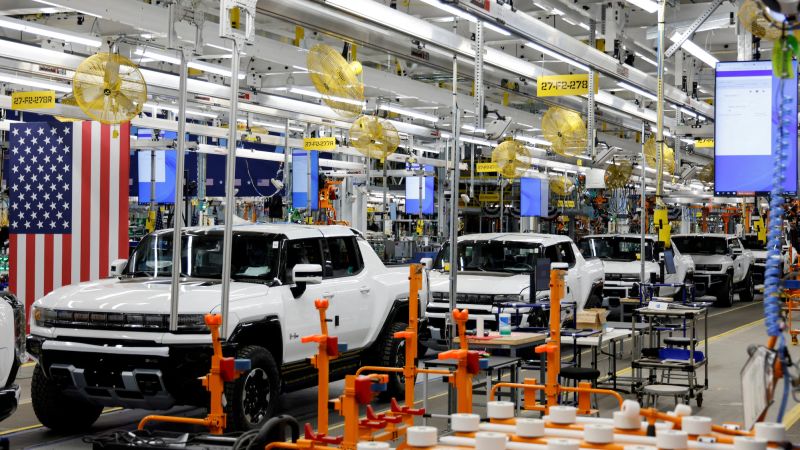The United Auto Workers (UAW) union, led by President Shawn Fain, is preparing for a potential strike as contract negotiations with the Big Three Detroit automakers become more contentious, with the union requesting substantial pay raises, an end to wage tiers, restoration of pensions for new hires, cost-of-living increases, and other benefits.
United Auto Workers members have overwhelmingly authorized a strike against General Motors, Ford Motor, and Stellantis during ongoing contract negotiations, with an average of 97% of members supporting the action, although the final votes are still being counted.
High-stakes negotiations between the United Auto Workers and Detroit automakers could lead to a strike later this month, putting added pressure on already beaten-down shares of Ford Motor.
The United Auto Workers union representing workers at the Big 3 U.S. automakers is demanding a four-day workweek at full-time pay, a 46% wage increase, and a share of company profits, threatening to strike if an agreement is not reached by September 14.
The United Auto Workers union is set to meet with General Motors to hear the automaker's counter offer after accusing the company of dragging its feet in negotiations, with the union threatening a strike if a deal is not reached by the contract deadline.
The United Auto Workers are in negotiations with the "Big Three" U.S. automakers over a new labor contract, with the possibility of a strike looming as talks have been rocky and counteroffers have been rejected.
Approximately 146,000 U.S. auto workers are poised to go on strike if General Motors, Ford, and Stellantis fail to meet their demands for substantial pay raises and restored benefits, potentially causing significant disruptions in auto production and impacting the U.S. economy.
Car dealerships are preparing for potential strikes by the United Auto Workers against Ford, General Motors, and Stellantis, which could lead to inventory shortages and higher prices for both new and used cars.
In ongoing contract negotiations, the United Auto Workers union is adopting a new strategy of negotiating national labor contracts with all three automakers at once, rather than selecting one company as the lead negotiator, in an effort to put pressure on the companies and achieve more favorable agreements.
The local auto workers' union at Ford's Sharonville transmission plant is preparing for a potential strike as the contract between the United Auto Workers union and the Big Three automakers expires, with picketing instructions issued and workers standing strong behind negotiators.
The United Auto Workers union could potentially strike at Detroit's Big Three automakers if a deal isn't reached by the contract deadline, although progress is being made in the talks regarding wages.
The president of the United Auto Workers union, Shawn Fain, who has only been in office for six months, could lead strikes by 145,000 members of his union at General Motors, Ford, and Stellantis starting this Friday, potentially impacting the American economy and the 2024 presidential election.
The United Auto Workers union plans to implement targeted strikes at certain plants if tentative contracts are not reached with General Motors, Ford Motor, and Stellantis, potentially affecting local contract issues and involving work stoppages only at specific plants.
The United Auto Workers' threat to strike against major automakers could test Joe Biden's claim of being the most pro-union president in US history and have significant economic and political implications, potentially causing car shortages and layoffs in auto-supply industries and other sectors.
The United Auto Workers (UAW) union, led by President Shawn Fain, is preparing to strike against the Detroit Three automakers after rejecting their pay raise offers, with coordinated strikes potentially occurring at all three automakers, marking a significant labor action.
The United Auto Workers union is threatening to strike over stalled contract negotiations, with one of their demands being a four-day workweek, working 32 hours for 40 hours of pay, in an effort to improve work-life balance and address long working hours.
Auto workers have initiated a series of strikes after failing to reach an agreement with the three largest US manufacturers over a new contract, marking a major industrial labor action and targeting all three Detroit carmakers simultaneously.
Strikes by United Auto Workers union at three major car manufacturing companies could potentially slow down the U.S. economy but are unlikely to trigger a recession, as global markets face industrial actions amid inflation and cost of living crisis.
More than 12,000 workers at the Big Three automakers are on strike in Michigan, Ohio, and Missouri due to inadequate wages and benefits, demanding higher pay and an end to the tiered employment system.
Autoworkers strike as United Autoworkers Union demands 36% pay increase over four years, affecting Michigan, Ohio, and Missouri; President Biden to speak on the matter later today.
The United Auto Workers President has set a new deadline for contract talks and threatened to call on more locals to join the strike if progress is not made, while the union's strategy of limited, targeted strikes has gained support among its members.
The United Auto Workers strike presents a risk to the U.S. economy, but it also demonstrates that workers are advocating for their fair share in a strong macroeconomy, according to Council of Economic Advisers Chair Jared Bernstein.
The United Automobile Workers' strike against Michigan automakers presents both advantages and risks for Tesla, as the electric vehicle maker can leverage the work stoppages to strengthen its lead in battery technology and software but also faces the U.A.W.'s determination to secure a victory for its members through union organizing efforts.
The United Auto Workers union is expanding its strike against major automakers by walking out of 38 General Motors and Stellantis plants in 20 states, citing demands for higher wages and shorter working hours.
